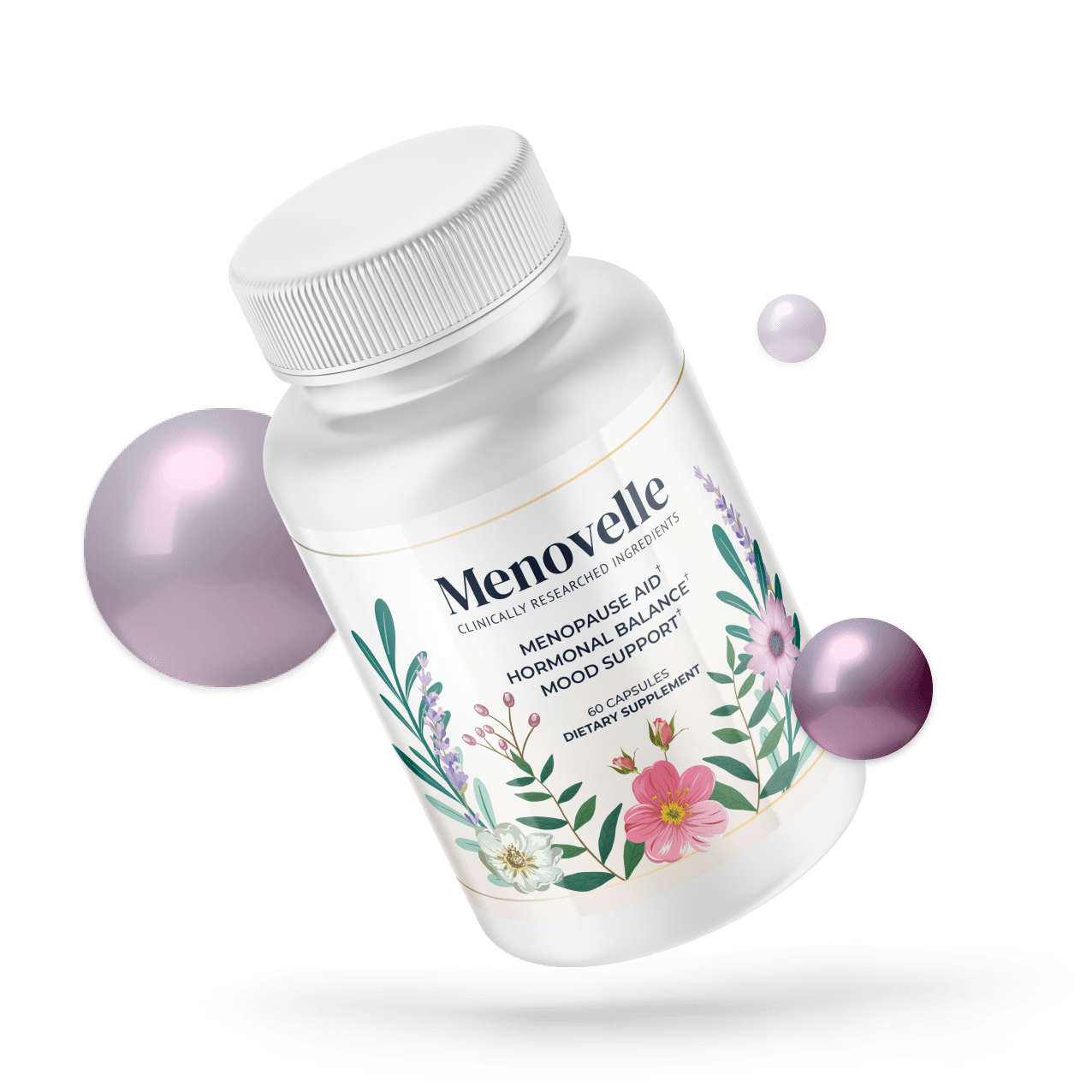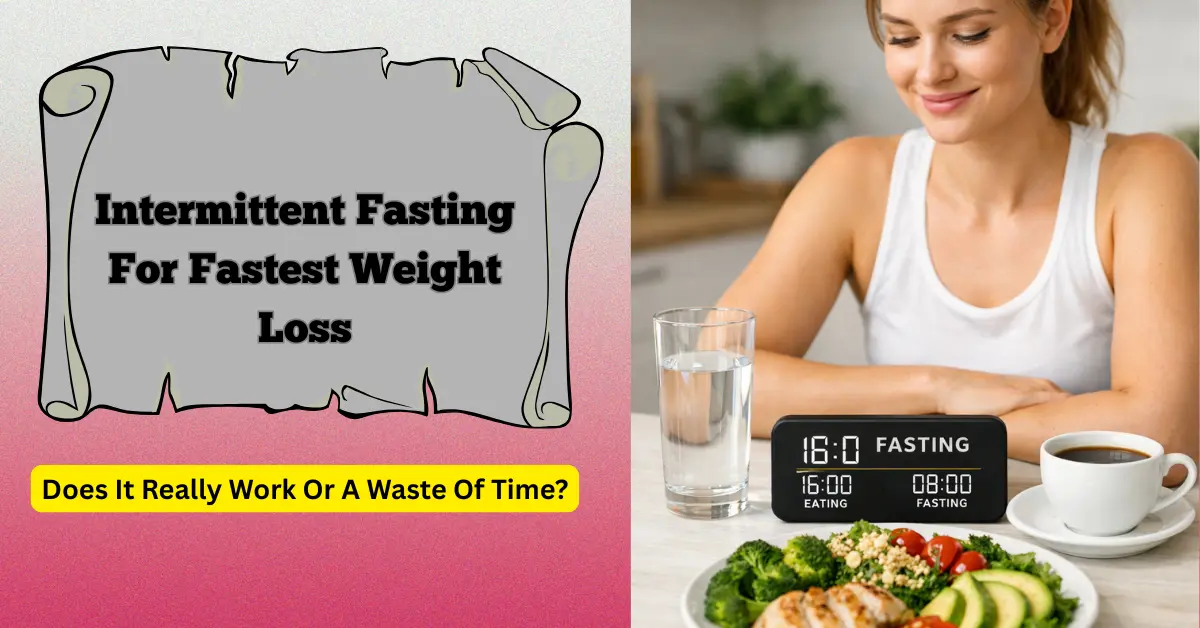A menopause diet to lose weight is all about making smart, workable changes that support your body during hormonal transformation. Women experiencing perimenopause and menopause often experience stubborn weight gain, specifically around the belly. However, implementing a menopause diet to lose weight can support you in managing your health in a balanced and healthy way.
Menovelle – A Breakthrough Natural Solution That Supports

“A Blissful Menopause & Hormonal Balance”
- Menovelle was created for menopausal women who deal with hot flashes, night sweats, mood swings, and weight gain. Upon closer look, experts have discovered that menopausal symptoms could be caused by “estrogen-eating fat cells” that entrap this crucial hormone.
- Our unique formula supports the activity of the “estro-gene.” This is the gene responsible for regulating estrogen and other essential hormones to ensure a blissful menopause and hormonal balance, all while helping you keep a healthy weight and enjoy a lean body.
This involves eating a wide range of natural plant-based foods, increasing lean protein consumption to help muscle mass, swapping out refined carbs for whole grains, and avoiding ultra-processed foods that can disturb metabolism. These scientifically researched methods not only help you in shedding pounds but also enhance overall well-being and help manage fatigue, bloating, and mood swings. By emphasizing long-standing nutrition rather than preventative dieting, you can achieve healthier weight management during your menopause period.
A menopause diet to lose weight emphasizes balanced and wholesome foods rather than strict calorie counting. By choosing extra whole foods, expanding protein, and reducing refined carbs, you can support your body over hormonal variations and achieve weight loss goals. Blending a menopause diet to lose weight with simple, regular exercise can enhance results. For better support with symptoms such as bloating or fatigue, for further details about a menopause diet to Lose Weight, Visit: The Menopause Survival Guide
How Menopause Causes Weight Gain and How a Menopause Diet To Lose Weight?
A well-balanced menopause diet to lose weight can play a key role in managing the body changes that arise during perimenopause and menopause. As oestrogen levels decrease, several women experience a change in fat dispersion, often storing around the belly, hips, and thighs, and a gradual loss of lean muscle mass, resulting in a visible change in body figure, even without significant weight gain.
Studies show that women usually gain weight around 0.7 kg (1.5 lb) per year in this period, but with the defined dietary techniques, it is likely to counteract these effects. A menopause diet to lose weight concentrates on eating nutrient-rich foods, getting enough protein, and decreasing refined carbs. This helps to maintain muscle, regulates hunger hormones, and helps to a healthy metabolism, making it easier to manage weight during menopause. Here are the main causes of gaining extra weight in women during the menopause period.
Increased Appetite Hormones: In perimenopause, mounting levels of ghrelin, recognized as the “hunger hormone,” can accelerate stronger hunger and increased activity in the brain’s reward hubs after eating. A menopause diet to lose weight can support you to regulate these hormonal changes by focusing on balanced meals, which alleviate blood sugar levels and promote satiety.
Decreased Protein Absorption: As you enter the menopause period, your body is not able to convert dietary protein into muscle, which can reduce your metabolic rate and lead to weight gain. A menopause diet to lose weight emphasizes a higher level of protein intake, which helps you to grow muscle and enhance metabolism. It helps you reduce extra body fat over time.
Intense Blood Sugar Responses: During menopause, your body’s reaction to sugar becomes more complex, making blood sugar spikes and crashes more familiar. This can lead to severe hunger and overeating. A menopause diet to lose weight focuses on regulating refined carbs and sugars, helping you to alleviate blood sugar levels and break the cycle of unhealthy hunger.
Poor Sleep Patterns: Another everyday symptom of menopause is a poor sleep pattern that reduces your metabolic rate and decreases your vitality level, which can boost snacking, particularly on carb-rich foods. This can generate a cycle of poor blood sugar responses and increased hunger.
What are the Best Diet Tips for a Healthy Menopause Diet to Lose Weight?
Forget preventative, short-term diets; for long-term results, consider the smarter options. A menopause diet to lose weight focuses on whole foods, balanced nutrients, and long-term behaviors that support hormone balance, metabolism, and overall health for workable weight loss.
Connects the Power of Plants
A menopause diet to lose weight helps greatly from a wide range of plant-based foods, researches show that menopausal women, who eat more plant-based foods as compared to animal protein, are more likely to lose fat quickly while protecting muscle mass. The fiber and prebiotics in plants also help gut health and the microbiome, which is a vital element for managing estrogen levels, a key factor in managing weight during menopause. Here are some examples of plants that include prebiotics:
Garlic, Onion Artichokes Tomatoes
Berries Chicory Asparagus Nuts
Beans & Pulses Whole-grains Leafy Green Vegetables Seeds
A balanced menopause diet to lose weight includes foods rich in phytoestrogens, a natural ingredient that mimics the effects of oestrogen in the body. Numerous plants include these nutrients, with isoflavones, which is found in soya beans, being specifically effective. Adding these into your daily meals can help to reduce belly fat, support lean muscle development, and support bone density. Additionally, research recommends that a phytoestrogen-based menopause diet to lose weight can to alleviate symptoms such as hot flushes, providing both metabolic and hormonal advantages during this middle stage.
Enhance Protein Consumption
Increasing protein ingestion is a sensible approach for managing weight during the menopause period. Research indicates that menopausal women who eat more protein manage to have less body fat and more lean muscle. It can happen because the body’s natural hunger for protein increases during this time, and if you don’t have adequate appetite for less healthy foods. The experts advised 1 to 1.2 grams of protein per KG of body weight daily, preferably with half from plant sources. But, those with healthier muscle mass and a smaller waistline often eat around 1.6 grams per KG, which equals about 115 grams daily for a 70 kg woman. Here are some of the healthy sources of protein:
Legumes, Tofu, Nuts & Seeds, Fish
Chicken Eggs Dairy Product Nuts
Milk & Yogurt
Try to minimize ultra-processed foods that are promoted as high in protein. The protein they deliver often comes without the other dietary benefits of whole foods and with extracts that are certainly unhealthy.
Create Healthy Changes for Sugar
A menopause diet to lose weight emphasizes decreasing refined carbs such as white bread, pasta, and sweet snacks. These kinds of foods can spike your blood sugar level, causing crashes that trigger craving, often causing overeating. Studies show that such crashes may cause people to eat up to 300 extra calories a day. For women going through menopause, indications like brain fog or mood swings, these blood sugar drops may generate deteriorating results. Avoiding ultra-processed foods, which are excessive in sugar and extracts, is a useful method to achieve weight loss goals and feel full and better during menopause.
Trying easy, healthy foods, such as choosing whole grains over white bread or fresh fruit instead of sweet snacks, may help to abolish post-meal hunger, help weight management, and boost your overall nutrition. These small but effective changes can make a great difference in how you feel and how your body responds to food.
- Swap refined carbohydrates for whole-grain changes, like brown rice and whole-wheat bread.
- Even healthier, swapping carbs for legumes, beans, lentils, or chickpeas are better lower-carb substitute to grains that will also improve your protein and fiber consumption.
- Swap sweets, cakes, and ultra-processed snacks for nuts, fruit, natural yogurt, or vegetable sticks with hummus.
- Picking up tea, coffee, or plain clean water over other sweet drinks and fruit juices.
Connects the Power of Beans
Legumes – like lentils, chickpeas, beans, and peas- are all nutritional centers that can play an important role in an effective menopause diet to lose weight. Their distinctive blend of benefits makes them precious, particularly in the menopause stage. Research has shown that women who consume more legumes manage to have lower body fat and slim waistlines. Legumes, which are rich in plant-based protein, help in maintaining lean muscle while promoting fat loss. Their rich fiber properties support satiety, eliminating the need for extra eating, while the prebiotics include nourishment and a healthy gut microbiome.
Legumes also deliver natural phytoestrogens, which can support you relieve hormonal symptoms. Swapping them for refined carbs such as white rice may help you balance blood sugar levels and prevent post-meal vitality crashes. With wider choices, from lentils and chickpeas to broad beans, soya beans, peas, and even peanuts, legumes are a beneficial, sustaining, and hormone-friendly food group valued to add to your daily diet.
Avoid Preventive Diets – Eat Carefully
Although eating less may help to lose weight, intense diet plans that eliminate whole food groups or depend on calculated calories are not seen to be healthy, specifically in the menopause period. These methods can slow down your metabolism and make it difficult to manage weight loss over time. As an alternative, focus on creating a maintainable routine by eating nutritious foods you like. Committed to mindful eating, paying complete attention to your meals without interruption may support you in making better appreciation of your food, feel more contented, and naturally reduce overeating.
Suggested Menopause Diet Meal Plan
Here are some of the tips which are suggested for a menopause diet to lose weight, including simple meal concepts that can help to get started. You can use them as they are or as motivation to produce your own. Just focus on swapping refined carbs for beans or whole grains, including a variety of vegetables, and adding healthy protein sources. Maintain ultra-processed foods at a minimum level, and when possible, slow down and strictly savour your meals; it can create a big change in how contented you feel.
Breakfast
Full Natural Yogurt with nuts, seeds, and berries
Crushed avocado with chives on a slice of wholegrain or sourdough toast
Bircher muesli, grated apple, steel-cut oats, and plain yogurt or kefir (make fresh or leave overnight)
Lunch
Burned Tofu or smoked mackerel salad with cooked broccoli, peppers, and pumpkin seeds
Crushed chickpeas with olive oil, ras el hanout spice mix, avocado, cherry tomatoes, and sesame seeds
Omelette: cheese and tomato/mushroom/onions and peppers, with a side salad or slice of sourdough
Dinner
Yellow lentil dahi mixed with floppy spinach and beaten with boiled eggs
Butter bean cassoulet with onions, carrots, and chicken thighs
Pan-friend salmon with asparagus and rosemary puy lentils
Snacks
A piece of hummus or bean dip with crudites (sliced peppers and cucumbers, carrot sticks, baby corn, green beans, Tenderstem broccoli)
A handful of mixed nuts
A piece of fruit
A few squares of 70%+ cocoa dark chocolate, without lecithins or other additives
Can Diet and Exercise Jointly Boost Menopause Weight Loss?
When you are willing to manage your weight during menopause, diet is not the only part of the problem. Adding a menopause diet to lose weight along with regular physical exercises, especially challenging training, can lead to more efficient and long-term results. Challenging exercises like weight lifting, bodyweight movement such as squats or push-ups, or using resistance bands not only help you to reduce your body’s fat and waistline but also help you in muscle maintenance, which is important as metabolism slows with age. The blend of targeted nutrition and strength training considerably increases the possibilities of nourishing a healthy weight through and beyond menopause.
Doing continuous resistance exercises while eating adequate protein can help you to maintain and strengthen your muscles, which can improve your resting metabolic rate and help with fat loss. When joined with a menopause diet to lose weight, this technique becomes even more effective. Incorporating regular aerobic exercise, such as brisk walking, jogging, swimming, or cycling not only helps your heart health but also boosts weight loss struggles. Health professionals recommend no less than 150 minutes of adequate to strong aerobic activity every week.
Conclusion:
As final words, managing weight during perimenopause and menopause does not need to be a dangerous dieting or impossible limitations. A balanced menopause diet to lose weight, which should be rich in whole foods, natural and plant-based ingredients, healthy proteins, and fiber, combined with regular resistance and aerobic exercise, provides an improved and more effective way to achieve long-term results. For further support for a menopause diet to lose weight, it may help to alleviate ordinary menopause symptoms such as hot flushes, depression, and digestive issues. ===> Visit the Menopause Survival Guide:<====







